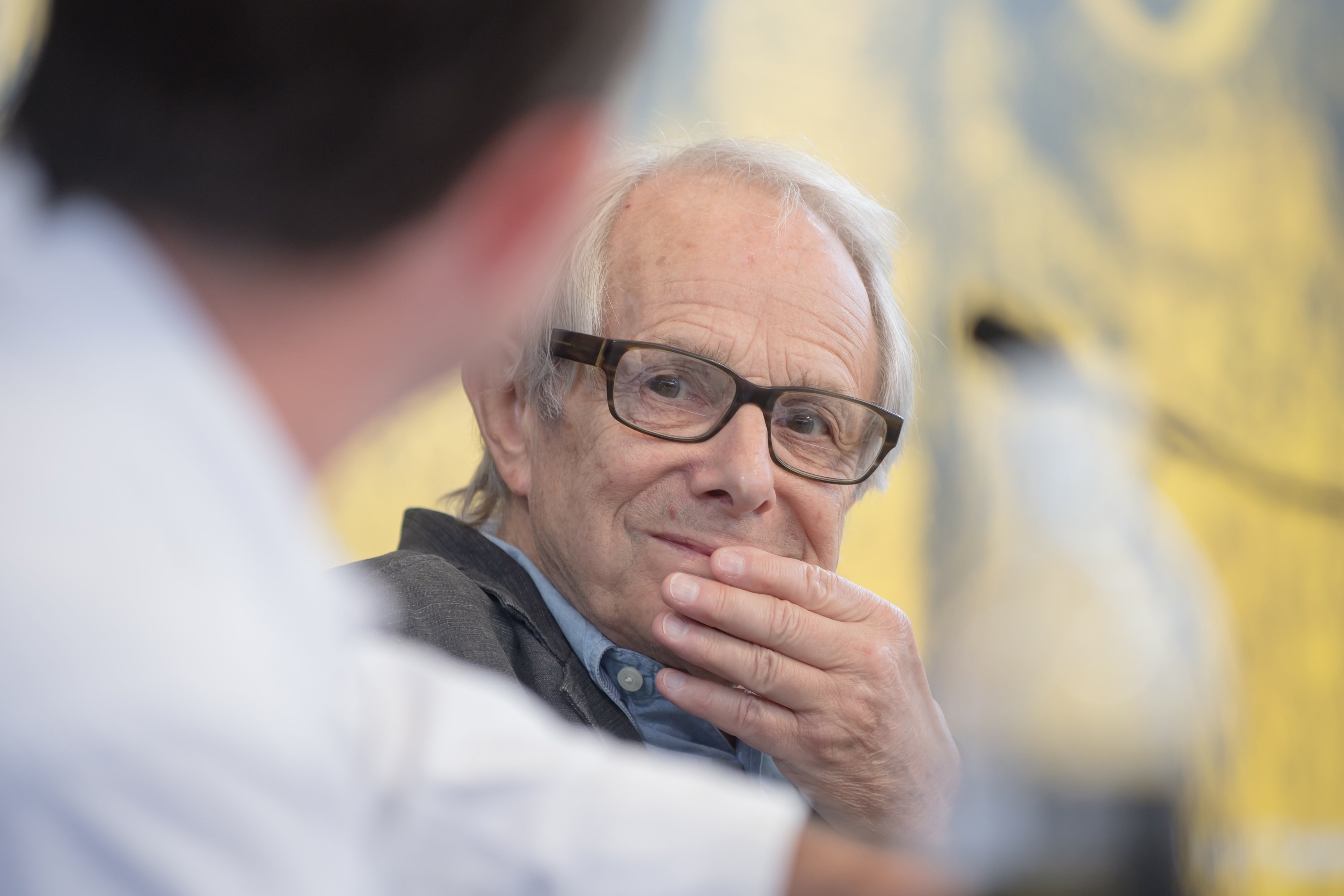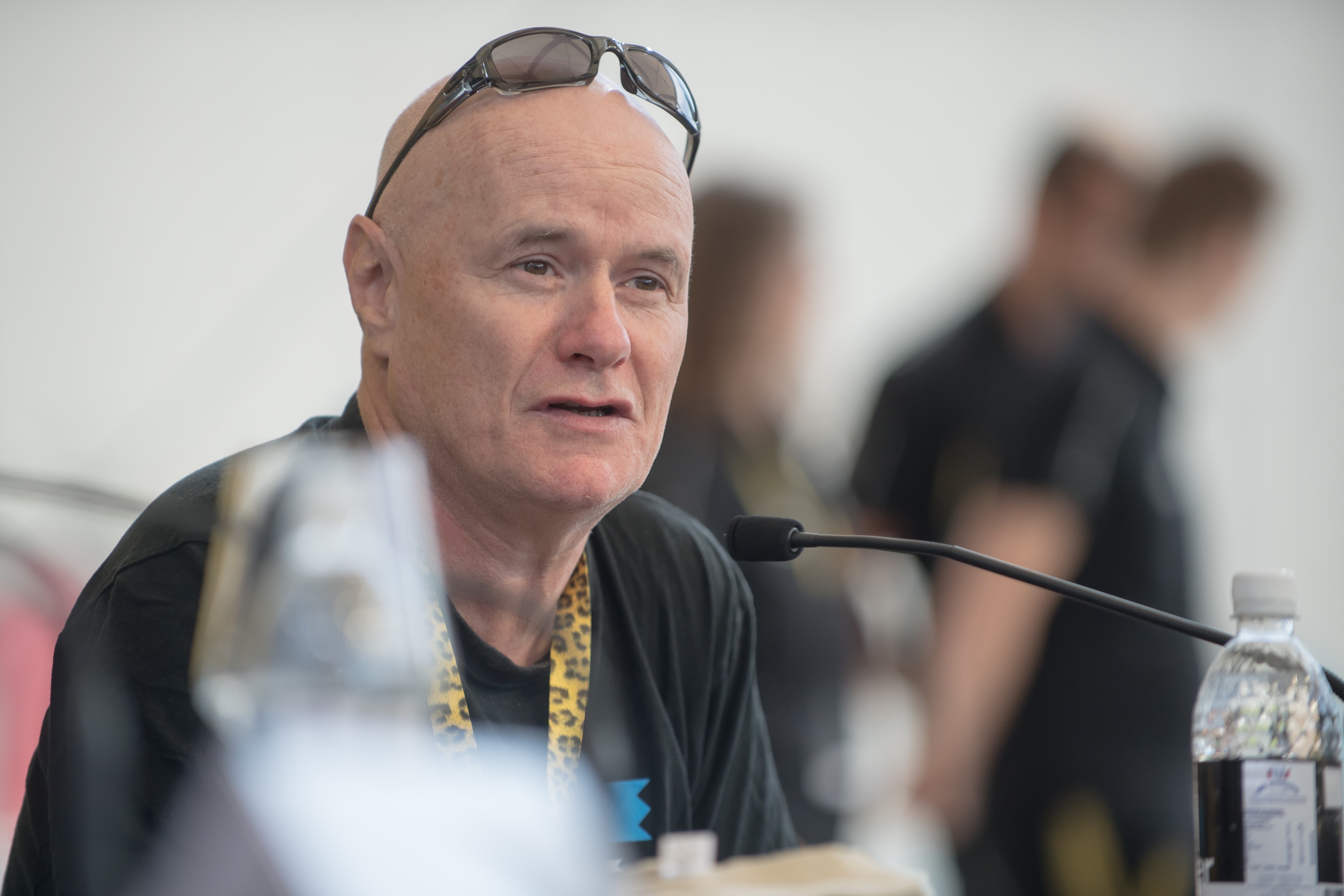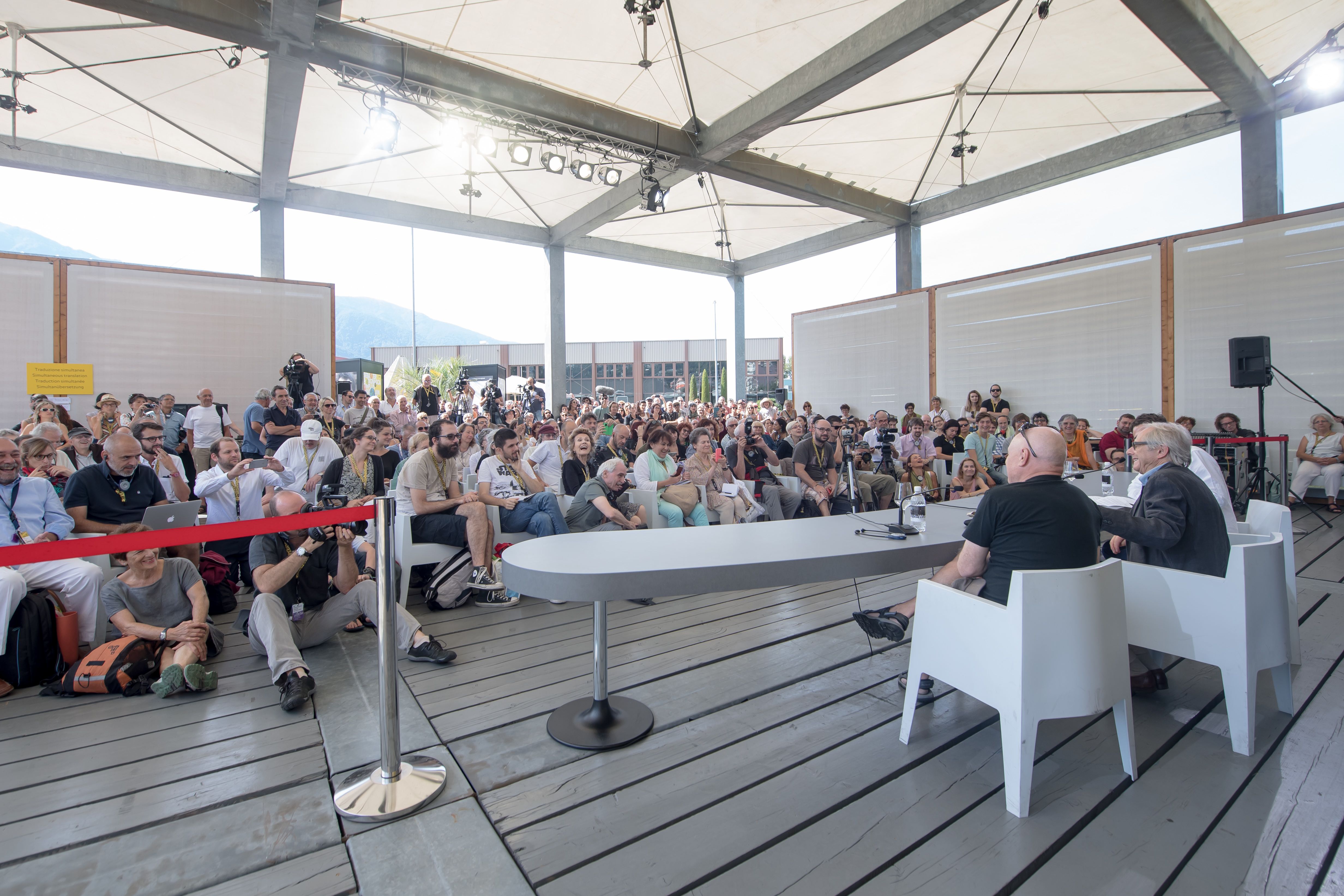
Ken Loach during the conversation with the audience in Locarno. © Festival du film de Locarno / Pablo Gianinazzi
Interview: I, Daniel Blake by Ken Loach, which received a Palme d’Or at the Cannes film festival, was awarded the Prix du Public in Locarno. In Ticino, the British film-maker was accompanied by Dave Jones, one of the main actors in the film, and by Louise Osmond, director of the documentary “Versus: The Life and Times of Ken Loach”. Focus on the filmography and interview with a great director.
A record for the Locarno Film Festival: soothed by the summer breeze, no less than 7500 people flocked to the Piazza Grande on August 11th to watch I, Daniel Blake and to give its director Ken Loach a standing ovation.
A film-maker at his peak
The plot as well as the topics dealt with in the movie evoke his previous films, most of which received public praise and critical acclaim. The Locarno fervour therefore no doubt fits into a long and beautiful sequence. The great interest shown for I, Daniel Blake in Ticino resonates with the ever-growing popularity of the film-maker.
The work of the artist, today aged 80, has borne fruit with impressive regularity for more than 40 years. Marked by the tradition of British social realism, his movies have been screened in cinema and television since the 1960s. Moved by the profound conviction that the world can be improved by the arts, the British director has been exploring with sheer truthfulness and brilliant accuracy the ordeals which the working classes have had to confront, and the suffering they still have to bear, in particular since the advent of post-fordism.
A history of friendship and solidarity
Also released this year, the documentary Versus: The Life and Times of Ken Loach, by Louise Osmond, was shown to the Locarno public a couple of hours before I, Daniel Blake. The viewers could immerse themselves in settings and atmospheres that his movies have made us familiar with. The story is peopled by characters of the urban and suburban British working class. The poverty that struck poor urban areas back then is hardly conceivable. Moreover, the mindset of the cultural and media elite of the time was not directed towards progress, to say the least: “This was a society of classes. We wanted to change it. No movie from that epoch would feature reality as it truly was, as real people were experiencing it in real life. For example, none would show the sexuality of the middle class or the working class.” This remark comes from Tony Garnett, the first producer the director worked with, whose voice is heard on several occasions in Louise Osmond’s documentary. Garnett would soon introduce Loach to Jim Allen, with whom his collaboration would last for 25 years.
In the poverty-stricken Chelsea neighbourhood, one used to queue for hours for the phone. The bath was shared with the entire community. Abortion was illegal. Garnett was five years old when his mother died from septicemia as a result of a back-street abortion. His father committed suicide ten days later. He was brought up by his uncle and aunt. With his university degree in hand, Garnett, like Loach, took acting lessons and auditioned for parts. With Poor Cow (1967) and Kes (1969), the TV film Cathy Come Home, broadcast by BBC1 in November 1968, allowed the public to get to know his work. Produced by Garnett, the movie features the relationship of a young couple. Cathy and Reg live happily together until Reg loses his job. That starts a progressive descent into hell, including losing the house and being deprived of parental authority. The episode during which her baby is forcibly removed from Cathy’s hands by a social worker gets everyone’s attention and will penetrate deeply into the collective conscience of many film-lovers, fans of the film-maker.
Born in Nuneaton (Warwickshire), Ken fell short of the ambition his father John, a factory electrician, had for him to become a lawyer. For a young man of his background, the examination to enter a public school was very selective and demanding. At St Peter’s College Oxford, Ken Loach studied law and was active in theater. There he was struck by the boundless arrogance of his peers, representatives of the ruling class which was still very powerful. Misery, unemployment, class struggle: he had not been fully exposed to these issues in his own family, or at least probably not to the same extent as Tony Garnett, Jim Allen or Paul Laverty. It is through their writings and their help as producers that he fully grasped these phenomena. With the help of “real actors”, for the most part non-professionals, he started a thoroughly documented and rigorous career based on fieldwork, testifying to the multiple facets of British social reality.
Since the late 1960s, Loach has been scrutinizing the various forms of social control, as well as the merchandising neurosis in the era of unabashed liberalism in the United Kindgom. His cinema describes with warmth and affection the friendship and solidarity in the British working class. His work has consequently been quick to evoke hostility from Tories and the conservative press. Skilled at looking at the past, Loach doesn’t avoid painful issues in the collective psyche, such as in his representation of the Irish drama haunting the British national narrative (for which he received his first Palme d’Or at Cannes: The Wind that Shakes the Barley (2006)).
From Family Life (1971) to I, Daniel Blake (2016), including Riff Raff (1991), which relaunched his career after a difficult period marked by the death of one of his children, Loach makes use of relentless energy and unyielding resolution to depict social themes: petty crime and the reinsertion efforts of former inmates (Riff Raff (1991), Sweet Sixteen (2002), Angel’s Share (2012)), dysfunctioning social institutions and services (Lady Bird (1994), I, Daniel Blake (2016)), how jobs have become progressively more and more precarious (Raining Stones (1993), My Name is Joe (2001)), the betrayal of their power base by trade union leaders (Question of Leadership (1981), The Navigators (2001)), the heroic battles of libertarian socialists and internationalists (Fatherland (1986), Hidden Agenda (1990), Land and Freedom (1995), Carla’s Song (1996)), the injustices suffered by migrant workers, cultural shock and the complexity of inter-ethnic relationships in the Anglo-Saxon world (Bread and Roses (2000), It is a Free World (2007)).
What can be achieved with “real actors”
The presence of Dave Jones in Locarno gave an opportunity to discuss the screenplay and the work of the I, Daniel Blake team. The film puts on trial the bureaucratic misconduct of British social services in the midst of rampant privatization. According to Loach, many people out of work or in bad health are falling prey to the conscious and deliberate cruelty of social services and employment agencies. Management methods adopted from the private sector result simply in punishing the poor. In the prize-winning film I, Daniel Blake, the main character has to appeal against a decision of the social services depriving him of his benefits. His recurrent heart problems are not enough to convince the private agency dealing with his case on behalf of the social services of his inability to work. His efforts lead him to a Job Centre, where he meets Katie. She herself has to live 250 miles from her home in order to avoid being placed in a homeless shelter, which would make her lose custody of her two children. The comforting ties between the two protagonists are all the more touching in that the story doesn’t have a happy ending.
Dave Jones told the Locarno audience about his collaboration with Ken Loach on this project. The background of the character of Daniel Blake that he plays in the film resembles that of his father. The actor grew up in Byker, in the Tyneside region of North-East England where several scenes were shot. He met Ken Loach after learning from a friend that Loach and his screenwriter Paul Laverty were prospecting in the region. The audition he and others in the project went through had little in common with traditional auditions. All those present talked freely and easily. On set, room was purposely left for improvisation. Ken Loach illustrated the actor’s point with a reference to the filming of Bread and Roses, where the two main actresses identified extremely closely with the characters they played. They consequently insisted that the film’s ending should match their own vision and interpretation and thus managed to send Paul Laverty’s scenario off in an unexpected but more realistic direction.
Coming back to his most recent film, Loach described the circumstances which had led him to take an interest in the massive and proven malfunctions in state services, in particular the job centres functioning under the twin pressures of austerity programmes and an ideology of “activation”. He gave the example of a 19-year-old youngster he met while doing field work. Heavily undernourished, he had fallen prey, like many others, to the modern slavery that casual labour represents. In parallel, Loach started to investigate the role of food banks. His conclusion: solidarity between people and good neighbourliness, which are luckily natural givens, are the only possible remedy for the complete failure of the state apparatus to carry out its mission. It is a complete disgrace that today the State is utterly incapable of putting into practice the principles of solidarity which justify its existence.

Dave Jones, one of the main actors in the award-winning film, describing the shooting of « I, Daniel Blake ». © Festival du film de Locarno / Pablo Gianinazzi
Jeremy Corbin: the Great Hope
The discussion then continued to issues of immediate political concern. “How did the actors and other members of the film crew of the film I, Daniel Blake relate to the issues at stake in the Brexit debate?”, asks someone from the audience. “Would Daniel and Katie have voted for Brexit?” According to Dave Jones, Daniel would have probably voted in favour in order to express his anger and resentment at the indifference of the elites for people in his situation. Ken Loach deemed it more likely that Katie would have voted “Remain”, because she had experience of living in big cities. Her perception of the encounters and the mixing of people with different religious or ethno-cultural backgrounds was positive.
Whatever the likelihood of these scenarios, one important hope was raised at the conclusion of the meeting. Ken Loach told the audience that the Labour Party was now at a turning point in its history. Drawing a parallel with Bernie Sanders in the context of the United States, the new leader of the Labour Party Jeremy Corbin truly intends to carry out left-wing policies. He has taken part in strikes, something no other leader of the Labour Party has done for a century. While enormous challenges loom ahead (such as countries’ debts or bankruptcy, widening inequality between the rich and the poor, global warming or migration crisis), Corbin might give the young and left-leaning people in Britain a long-awaited and well-deserved feeling of dignity and self-confidence. To conclude, Loach emphatically stressed the need “for self-confidence and cohesion as a class” and invited the Locarno audience “never to give up the possibility of hope”.
“In our work the writer, not the director, was the main creator”
At the Hotel Belvédère in Locarno, Ken Loach was kind enough to give modest answers to some questions on aspects of his œuvre.
Throughout your filmography, you have explored the impact of the transformations of the nature of work and the labour market on the life of the British working class. During the post-war boom, protection was based on social insurance designed for workers in industry or the classical service sector, who had few qualifications but enjoyed long-term employment contracts. Would it be true to say that you have shown how this model, since the end of the boom years, can no longer protect people whose working lives are much more mobile and whose trajectories are less linear and more precarious?
I have indeed explored these themes, for example in Which side are you on? which was about the miners’ strikes in the 1980s. I also did a documentary on the Liverpool dockers, the last registered dock-workers defending their jobs against casualisation. That was in the mid 1990s, precisely at the moment in time when the nature of work was changing.
Your film The Navigators (2001) also discusses these themes?
Yes, that film was about casualisation and privatisation and how job security disappears. Of course, it is a process. All the time work is becoming more and more precarious.
During the conversation with the public this morning in Locarno, you said that films can “agitate”. However, you also said that they can only “educate” in a limited way and that they cannot “organize” (the world, social reality). In your view, how do films contribute to raising the awareness of the “citizen audience”?
I think they can help you articulate the anger you feel. I think that if you feel a general sense of dissatisfaction or antagonism at the situation (like people shouting at the television because they are fed up with the news), it can help you focus your discontent. So that it becomes a specific anger at a precise situation. It may crystallise how you feel. Out of that, you may be led on to take part in a campaign or to read a book, or to be part of something wider. And perhaps it also helps you to see your own situation better. You might be confused about your own situation because you cannot separate the details out of the overall structure; if you see someone else’s story, it helps you see your own situation more clearly…the situation of your community or of the place where you work.
You said this morning that most of your films feature characters who have to confront complex dilemmas. Overarching principles, such as morality, expediency and necessity, are at play in these dilemmas, and find it difficult to coexist. In your last film, I, Daniel Blake, these dilemmas, as well as the suffering they create, again emerge very clearly.
Several of my films have these dilemmas at their core. My Name is Joe captures these dilemmas particularly well. It comes from the writing of Paul Laverty. It is where Paul’s writing is so good. I must stress that in everything we have done the writer, not the director, is the main creator. I am very keen to see that the screenwriter gets his share of the credit. And Paul’s writing is brilliant! In My Name is Joe, the dilemma is that, in order to protect the young boy, he has to do a drug run. That’s a terrible thing to have to do. Joe himself is a recovering alcoholic. He is in a relationship with a woman who is a counsellor helping people with drug problems. But, in order to protect a young friend, he has to help a drug baron. It is a terrible dilemma, you know. He says in his agony, “What choice do I have?”. Paul’s writing is very much about choices… the choices that people have. In Sweet Sixteen, the only way the young kid can establish a relationship with his mother is through dealing drugs. And yet, it is drugs that put him in prison. These are the choices, the dilemmas faced by people with no economic power…
What are the main dilemmas faced by the heroes in I, Daniel Blake?
The main dilemma in I, Daniel Blake is faced by Katie. The only way she can survive is through selling her body. She is faced with a dilemma of degradation. Does she eat? Does she feed her kids? And does she prostitute herself? A lot has actually been written about this dilemma, from the point of view of women who become prostitutes.
In Louise Osmond’s documentary Versus: The Life and Times of Ken Loach, your friends point out the long effort of persuasion it took to convince public television to support your films. You had to convince the BBC as well as Channel 4 that your movies were well enough made to avoid unnecessary scandal, that they had social value and would serve the best interests of the public.
That was a reflection of the politics of the time. In the 1960s, the ruling class was more confident, so they were more open. In the 1980s, it was simply a time of class conflict. Thatcher wanted to destroy the power of organized labour and initiated a class conflict. During that battle the ruling class was very intolerant. At the time, as always, the situation was a reflection of the power balance between classes.
When you made Riff Raff was there more flexibility on the part of the BBC?
Yes, in the 1990s it eased because the ruling class had won. By the mid to late 1980s, the ruling class had won. They had beaten the trade unions. They introduced mass unemployment as a permanent feature of the economy, which is what they wanted because then labour is cheap. They got anti-union legislation. They were leading the way throughout Europe — all the European countries were following them. It was the counter-revolution.
Could you summarize why you consider it important to work with beginners or non-professional actors, and how you proceed with them?
I don’t treat actors like one treats an interviewee in a job interview. We just sit together and we talk about something or other, something they know about and I don’t. Then they become the experts. For me friendship and solidarity are the most important, on and off the set.

The Locarno conversation attracted a large assemblee eager for a conversation with the cineast. © Festival du film de Locarno / Pablo Gianinazzi
The French version of this article initially appeared in Gauchebdo.




Laisser un commentaire
Soyez le premier à laisser un commentaire